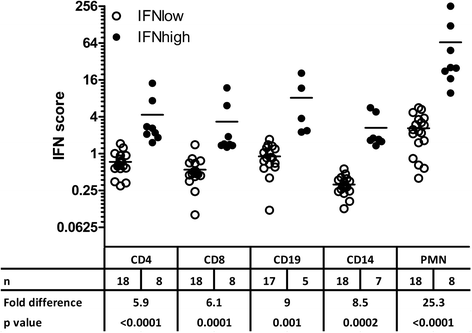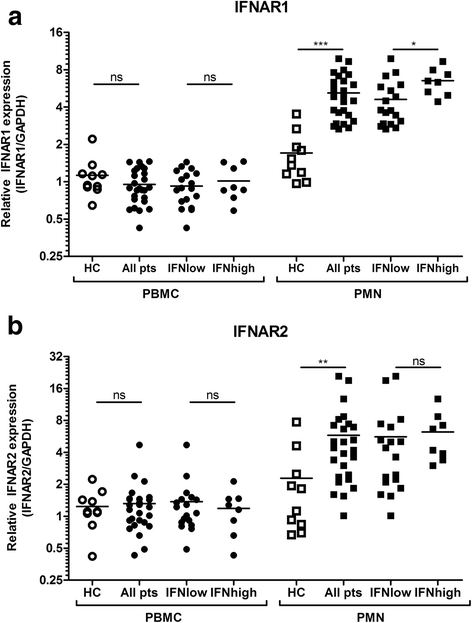The type I interferon signature in leukocyte subsets from peripheral blood of patients with early arthritis: a major contribution by granulocytes
- PMID: 27411379
- PMCID: PMC4944477
- DOI: 10.1186/s13075-016-1065-3
The type I interferon signature in leukocyte subsets from peripheral blood of patients with early arthritis: a major contribution by granulocytes
Abstract
Background: The type I interferon (IFN) signature in rheumatoid arthritis (RA) has shown clinical relevance in relation to disease onset and therapeutic response. Identification of the cell type(s) contributing to this IFN signature could provide insight into the signature's functional consequences. The aim of this study was to investigate the contribution of peripheral leukocyte subsets to the IFN signature in early arthritis.
Methods: Blood was collected from 26 patients with early arthritis and lysed directly or separated into peripheral blood mononuclear cells (PBMCs) and polymorphonuclear granulocytes (PMNs). PBMCs were sorted into CD4(+) T cells, CD8(+) T cells, CD19(+) B cells, and CD14(+) monocytes by flow cytometry. Messenger RNA expression of three interferon response genes (IRGs RSAD2, IFI44L, and MX1) and type I interferon receptors (IFNAR1 and IFNAR2) was determined in whole blood and blood cell subsets by quantitative polymerase chain reaction. IRG expression was averaged to calculate an IFN score for each sample.
Results: Patients were designated "IFN(high)" (n = 8) or "IFN(low)" (n = 18) on the basis of an IFN score cutoff in whole peripheral blood from healthy control subjects. The difference in IFN score between IFN(high) and IFN(low) patients was remarkably large for the PMN fraction (mean 25-fold) compared with the other subsets (mean 6- to 9-fold), indicating that PMNs are the main inducers of IRGs. Moreover, the relative contribution of the PMN fraction to the whole-blood IFN score was threefold higher than expected from its abundance in blood (p = 0.008), whereas it was three- to sixfold lower for the other subsets (p ≤ 0.063), implying that the PMNs are most sensitive to IFN signaling. Concordantly, IFNAR1 and IFNAR2 were upregulated compared with healthy controls selectively in patient PMNs (p ≤ 0.0077) but not in PBMCs.
Conclusions: PMNs are the main contributors to the whole-blood type I IFN signature in patients with early arthritis, which seems due to increased sensitivity of these cells to type I IFN signaling. Considering the well-established role of neutrophils in the pathology of arthritis, this suggests a role of type I IFN activity in the disease as well.
Keywords: Granulocytes; Rheumatoid arthritis; Type I interferon.
Figures



References
-
- van der Pouw Kraan TC, Wijbrandts CA, van Baarsen LG, Voskuyl AE, Rustenburg F, Baggen JM, et al. Rheumatoid arthritis subtypes identified by genomic profiling of peripheral blood cells: assignment of a type I interferon signature in a subpopulation of patients. Ann Rheum Dis. 2007;66:1008–14. doi: 10.1136/ard.2006.063412. - DOI - PMC - PubMed
-
- Cantaert T, van Baarsen LG, Wijbrandts CA, Thurlings RM, van de Sande MG, Bos C, van der Pouw Kraan TC, Verweij CL, Tak PP, Baeten DL. Type I interferons have no major influence on humoral autoimmunity in rheumatoid arthritis. Rheumatology (Oxford). 2010;49:156–66. - PubMed
-
- van Baarsen LG, Bos WH, Rustenburg F, van der Pouw Kraan TC, Wolbink GJ, Dijkmans BA, van SD, Verweij CL. Gene expression profiling in autoantibody-positive patients with arthralgia predicts development of arthritis. Arthritis Rheum. 2010;62:694–704. - PubMed
-
- Lübbers J, Brink M, van de Stadt LA, Vosslamber S, Wesseling JG, van Schaardenburg D, Rantapaa-Dahlqvist S, Verweij CL. The type I IFN signature as a biomarker of preclinical rheumatoid arthritis. Ann Rheum Dis. 2013;72:776–80. - PubMed
Publication types
MeSH terms
Substances
LinkOut - more resources
Full Text Sources
Other Literature Sources
Medical
Research Materials

